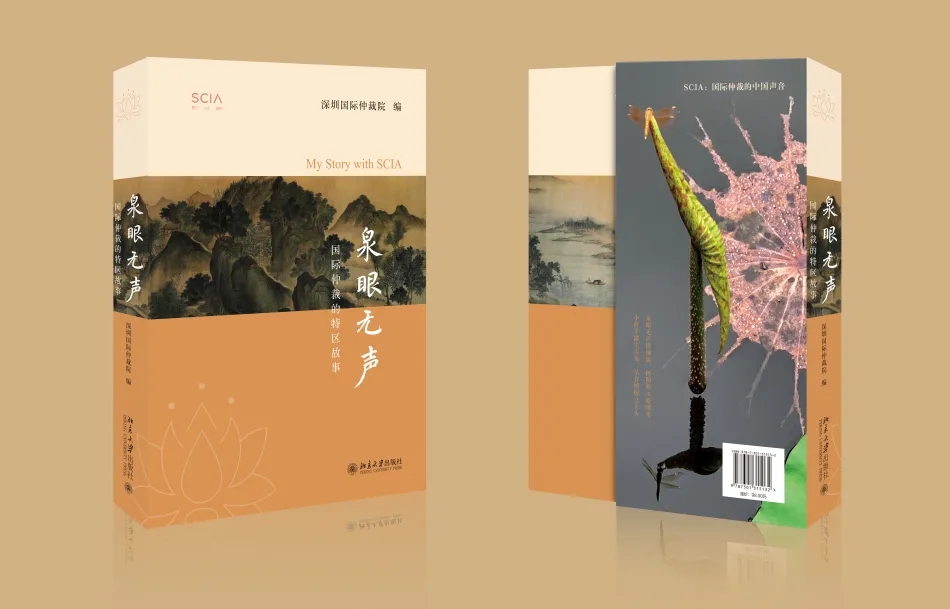
Susan Finder:相逢一笑是前缘 ——我与特区国际仲裁的点滴
发布时间:2021-02-07 10:11:05
编者按:
深圳国际仲裁院(又名华南国际经济贸易仲裁委员会、深圳仲裁委员会,曾用名中国贸促会对外经济贸易仲裁委员会深圳办事处、中国国际经济贸易仲裁委员会深圳分会、中国国际经济贸易仲裁委员会华南分会,中文简称“深国仲”,英文简称“SCIA”)由广东省经济特区管理委员会和深圳市委、市政府创立于1983年,是中国改革开放和经济特区建设的产物,是中国改革开放以来各省市设立的第一家仲裁机构,也是粤港澳地区第一家仲裁机构。
近40年来,深国仲锐意改革,持续创新,积极推动中国仲裁的国际化、现代化和专业化:1984年,在中国内地率先聘请境外仲裁员;1989年,开创中国内地仲裁裁决依照联合国《承认及执行外国仲裁裁决公约》获得境外法院强制执行的先例;2012年,在全球仲裁机构中率先探索法定机构管理机制,成为中国内地首个推行国际化法人治理机制的仲裁机构;2017年,创建中国国际仲裁第一个海外庭审中心,并开创常设仲裁机构合并的先例;2019年,率先探索国际仲裁“选择性复裁”制度……目前,深国仲仲裁员覆盖77个国家和地区,仲裁和调解当事人遍及全球119个国家和地区。特区国际仲裁已经成为国际化营商环境的重要组成部分。
为庆祝深圳经济特区建立40周年,深国仲和深圳商报以“深圳特区40年·我与特区国际仲裁的故事”为主题,广泛征集特区国际仲裁机构的初创者、特区仲裁治理机制改革的参与者、仲裁员、调解员、谈判专家、律师代理人和中外企业当事人的故事,共同回顾特区国际仲裁伴随着中国改革开放而持续创新发展的历程。今天分享的是北京大学国际法学院长期访问杰出学者、最高人民法院国际商事专家委员会专家委员范思深(Susan Finder)女士的文章(附中文译文)。本文已收录在北京大学出版社2020年8月出版的《泉眼无声:国际仲裁的特区故事》之中。

Susan Finder is a Distinguished Scholar in Residence at the School of Transnational Law of Peking University. She is also a member of the International Commercial Expert Committee of China's Supreme People's Court and a panel arbitrator of SCIA.
My Story of International Arbitration at SCIA
Susan Finder
My story of international arbitration at SCIA is likely one of the more unusual ones. I have been involved with SCIA for over thirty years, and have been privileged to know many of the former leaders. SCIA has consistently been one of the most, if not the most open and internationalized Chinese arbitral institutions, taking full advantage of being in China’s most innovative and open cities.
I was privileged to come to know SCIA, then the Shenzhen Commission of CIETAC through Anthony Neoh, S.C., who brought me along to one of his frequent visits. I was then a lecturer in the Law Department of the City Polytechnic of Hong Kong. I have since been involved with SCIA at every stage of my career ever since, in teaching at what is now the City University of Hong Kong, a lawyer at Freshfields, Winston & Strawn, editor at Practical Law, and now teaching at the School of Transnational Law of Peking University.
In the early days, the office was then in Tongjian Building, and the rooms were not then fully air conditioned. I recall the hearing room becoming a nap room during the Shenzhen hot summers. At the time, (the late) Dong Yougan and Zhou Huandong led the office. Dong had studied law before 1949 and he overcame many difficult years of suffering during the Cultural Revolution to head the Shenzhen Commission. It was an appropriate role for a professional and honorable man. Zhou Huandong was uniquely able to spot talent. The staff of the Secretariat at the time included many outstanding people who have risen to be senior members of SCIA, such as Guo Xiaowen (retired secretary general), Zeng Yinyan, Guan Li, and many others who I remember very fondly. Others have left Shenzhen and the Arbitration Commission but remain major contributors to Chinese arbitration, by serving as sole or panel arbitrators in difficult cases. Among them are Li Hong and Chen Luming, now outstanding lawyers in Shanghai. I recall some staff being able to intern in Hong Kong, giving them a practical idea of how another jurisdiction operates in practice. One of those Secretariat staff included Xu Sanqiao, now an outstanding lawyer in Shenzhen. When Mr. Dong retired and went back to Beijing, Mr. Xiao Zhiming succeeded him. Mr. Xiao as a leader from Shenzhen continued the internationalized and open tradition.
Thereafter Mr. Guo Xiaowen became head of the Commission, making a major contribution to Chinese arbitration - establishing SCIA as a statutory body with independent status. His clear thinking, deep consideration of the way a foreign model could be adjusted to fit Chinese realities, and skillful navigation of procedural requirements were truly impressive. It is at that time I got to know Liu Xiaochun better. The model of SCIA as a statutory body is an important guarantor of its autonomy, ability to innovate, and be an international force.
As many people know, in the past seven years I have been writing about the Supreme People’s Court (SPC) in an English language blog, giving my perspective on its developments and am now a Distinguished Scholar in Residence at the School of Transnational Law of Peking University. In that role I have been honored to help our students understand international arbitration through SCIA, and I am glad that some of our students are making important contributions to the work of SCIA. As a SCIA arbitrator, I have been privileged to be invited to arbitrator training and major professional events sponsored by SCIA. It is thanks to these events that I have been able to learn about cutting edge issues involving the Chinese judiciary and arbitration, and become acquainted with some outstanding members of China’s judiciary, including several senior judges of the SPC, judges of the Shenzhen Intermediate People’s Court, and judges of the Qianhai Cooperation Zone People’s Court. I was glad to see that Liu Xiaochun was one of the representatives of Chinese arbitration commissions who was invited to attend the first meeting of the SPC’s International Commercial Expert Committee, and SCIA is one of the institutions cooperating with the SPC and China International Commercial Court (CICC).
SCIA has consistently been one of the most, if not the most open and internationalized Chinese arbitral institutions, secured by its statutory body status, taking full advantage of being in China’s most innovative and open cities, attracting outstanding arbitrators from China and abroad to join its panel.
Congratulations to SCIA and may it go from success to success!
范思深(Susan Finder),北京大学国际法学院长期访问杰出学者,最高人民法院国际商事专家委员会专家委员,深圳国际仲裁院仲裁员。
相逢一笑是前缘——我与特区国际仲裁的点滴
范思深(Susan Finder)
我在深圳国际仲裁院(SCIA)的国际仲裁故事可以说绝不寻常。与深国仲打交道至今已三十余年,这期间我有幸得识深国仲的很多领导。寄身于中国最具创新性和开放性的城市,深国仲一直都是中国最开放和最国际化的仲裁机构之一。
我经由梁定邦资深大律师的介绍,得以有机会了解深国仲——当时还叫中国国际经济贸易仲裁委员会深圳分会。梁先生彼时常往返于深港之间,我在香港城市理工学院法律系做讲师的时候曾随梁先生到过一次深国仲。从那时起,不管是我后来在香港城市大学任教,在富而德(Freshfields)律师事务所和温斯顿(Winston & Strawn)律师事务所做律师,在《实用法律年鉴》(Practical Law)当编辑,还是如今在北京大学国际法学院任教,我职业生涯的每一个阶段都与深国仲紧密相连。
早期的深国仲在统建楼办公,有些房间还没有装空调。我记得开庭室也是午休室。当时,深国仲的领导是董有淦和周焕东,二老如今都已作古。董老1949年之前即学习法律,后来在深国仲担任主任,对一位专业且可敬的老先生而言也不失为一理想的归宿。周老则堪称伯乐。当时秘书处的人员有很多后来成长为深国仲的中流砥柱型的人才,比如郭晓文(时任秘书长,现已退休)、曾银燕、关莉以及很多我非常想念的人。还有一些已经离开深圳和深国仲,但以担任仲裁员办理疑难案件的形式继续为中国仲裁贡献力量的老友,包括李红、陈鲁明,两位现在是上海非常优秀的律师。我还记得秘书处当时派员到香港实习,以了解另一个法域的仲裁机构实际运作的第一手资料。其中一位就是现已是深圳顶尖律师的徐三桥。董老退休后回到北京,接任的是肖志明。肖志明延续了深国仲国际化和开放的传统。
再往后,郭晓文担任了深国仲的理事长,为中国仲裁作出了一大贡献——推动深国仲进行法定机构管理。他的思路清晰,对借鉴外国法定机构立法模式以适应中国实际的深思熟虑,以及对按规范行事的工作作风都给我留下了深刻的印象。也是在那个时候,我通过他得以更了解刘晓春。深国仲的法定机构管理模式是其独立运作、持续推陈出新、积极参与国际竞争的重要保障。
很多人都知道,过去七年我一直在英文博客上撰写有关最高人民法院的文章,就其发展给出我自己的看法。我现在是北京大学国际法学院长期访问杰出学者。担任教职使我有幸帮助学生通过深国仲了解国际仲裁,我很高兴看到我的很多学生毕业后加入深国仲,为其发展贡献力量。作为深国仲的仲裁员,我有幸多次受邀参加深国仲主办的仲裁员培训和大型的专业交流活动。正是通过这些活动,我才得以了解中国司法和仲裁的前沿问题,并结识了中国司法机关的一些杰出人士,包括最高人民法院的几名资深法官,深圳市中级人民法院的法官,以及前海合作区人民法院的法官。我很高兴看到深国仲被最高人民法院纳入“一站式”国际商事纠纷多元化解决平台并与国际商事法庭紧密联系,刘晓春也受邀作为入选机构的代表参加最高人民法院国际商事专家委员会的首次会议。
有法定机构地位的制度保障,有位于中国最具创新性和开放性城市的地缘优势,有中外最顶尖仲裁员慕名而来的人才效应,深国仲的开放和国际化始终都走在中国国际仲裁机构前沿。
衷心祝愿并期许深国仲,未来更上一层楼!
译者简介:李雄风,深圳国际仲裁院理事会秘书。




